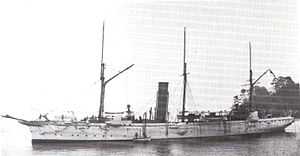HMS Racoon (1887)
For other ships of the same name, see HMS Racoon.
 | |
| Career (United Kingdom) | |
|---|---|
| Name: | HMS Racoon |
| Ordered: | 1885[1] |
| Builder: | Devonport Dockyard |
| Cost: |
Hull: £60,600 Machinery: £31,000[1] |
| Laid down: | 1 February 1886 |
| Launched: | 6 May 1887 |
| Commissioned: | 1 March 1888 |
| Decommissioned: | 1 January 1905 |
| Fate: | Sold to G Cohen on 4 April 1905[1] |
| General characteristics | |
| Class and type: | Archer-class torpedo cruiser |
| Displacement: | 1770 tons |
| Length: | 140 ft (43 m) |
| Beam: | 36 ft (11 m) |
| Draught: | 13.5 ft (4.1 m) |
| Installed power: | 2,500 ihp (1,900 kW) 4,500 ihp (3,400 kW) forced draught |
| Propulsion: | Twin 2-cylinder compound steam engines Four boilers Twin screws |
| Speed: | 17.5 kn (32.4 km/h)[1] |
| Range: | 7,000 nmi (13,000 km) at 10 kn (19 km/h) |
| Complement: | 176 men |
| Armament: |
|
| Armour: |
|
HMS Racoon, sometimes spelled HMS Raccoon, was an Archer-class torpedo cruiser of the Royal Navy. Racoon was laid down on 1 February 1886 and came into service on 1 March 1888.[2][3] She served on the East Indies Station where, on 27 August 1896, she was involved in the bombardment of Sultan Khalid's palace during the 40 minute Anglo–Zanzibar War.[4]
In early May 1901 Racoon returned to the United Kingdom,[5] and was paid off at Sheerness on 6 July 1901.[6]
She was decommissioned on 1 January 1905 and sold for scrap.[2][7]
References
- ↑ 1.0 1.1 1.2 1.3 1.4 1.5 Winfield, Rif & Lyon, David (2004). The Sail and Steam Navy List: All the Ships of the Royal Navy 1815–1889. London: Chatham Publishing. ISBN 978-1-86176-032-6. OCLC 52620555.
- ↑ Patience 1994, p. 11.
- ↑ Patience (1994)
- ↑ "Naval & Military intelligence" The Times (London). Wednesday, 24 April March 1901. (36437), p. 11.
- ↑ "Naval & Military intelligence" The Times (London). Monday, 8 July 1901. (36501), p. 6.
- ↑ Archer Class at Battleships-Cruisers
Bibliography
Patience, Kevin (1994), Zanzibar and the Shortest War in History, Bahrain: Kevin Patience, p. 23
| ||||||||||